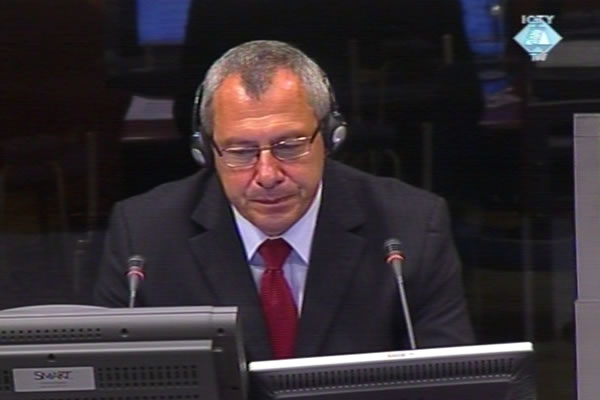Home
MLADIC’S DIARIES ADMITTED INTO EVIDENCE
At the trial of Radovan Karadzic the prosecution tendered into evidence Ratko Mladic’s diaries, seized in December 2008 and February 2010 in the Belgrade apartment of Mladic’s wife. In a brief cross-examination, Karadzic focused on the translation of the diaries and the situation his and Mladic’s families faced; as he said, they were ‘abused even more than Osama Bin Laden’s brother’. In the end, Karadzic said he was not contesting the diaries’ authenticity
 Tomasz Blaszczyk, witness at Radovan Karadzic trial
Tomasz Blaszczyk, witness at Radovan Karadzic trial Before a two-week adjournment at the trial of Radovan Karadzic, the prosecution called investigator Tomasz Blaszczyk to the witness stand. Blaszczyk testified about the chain of custody of Ratko Mladic’s diaries from the time they were recovered in Belgrade to their transfer to the Tribunal, and about the authenticity of seized documents.
As Blaszczyk said, the Serbian police seized the first five notebooks and four video tapes during their search of the apartment used by Mladic’s wife Bosiljka on 4 December 2008. The Serbian police scanned the diaries and forwarded the scans to the Tribunal. The witness took receipt of the original notes in late March 2009, brought them to The Hague and delivered them to the ICTY evidence section. From the time he took receipt of the seized documents to the moment when he handed them over to the Tribunal, Blaszczyk was the only person with access to the material.
The police found the remaining notebooks, audio and video tapes and other documents during their search on 23 February 2010. The documents were handed over to an official of the OTP in Belgrade. After that, the witness took the materials and took them to The Hague. On both occasions, the police inventoried the confiscated materials and Mladic’s wife Bosiljka and son Darko signed the list.
In an effort to prove the authenticity of the diaries, the prosecutor showed excerpts from the video materials recorded during the war. In the footage, Mladic is seen taking notes during meetings. The conversations in the recordings match what Mladic wrote down. The color of the notebooks and other visible marks match the originals that were also presented in the courtroom. Mladic’s war deputy general Manojlo Milovanovic confirmed in a written statement the authenticity of Mladic’s handwriting.
In his brief cross-examination, Karadzic focused on the translation of the diaries and the situation his and Mladic’s families faced. As Karadzic put it, their families were ‘abused even more than Osama Bin Laden’s brother’. Karadzic finally said he wasn’t contesting the authenticity of Mladic’s handwriting. However, Karadzic opposed the admission of the diaries into evidence in their entirety: their value was questionable because they were ‘linguistically incomplete’. In Karadzic’s view, the diaries are ‘short notes’ Mladic planned to use as a reminder while writing his memoires.
Karadzic’s legal advisor Peter Robinson confirmed that the defense didn’t challenge the authenticity of the diaries because they were ‘of great assistance to the defense’; they ‘confirm what Karadzic has been claiming all along’. Expressing his concern over the admission of the diaries in their entirety, Robinson asked that excerpts from the diaries be admitted gradually, as each particular entry is linked with other documents or evidence given by witnesses.
After a brief consultation, the judges admitted into evidence all of Mladic’s notebooks, explaining that the Trial Chamber would consider their evidentiary value after the trial in the context of other evidence.
Before the two-week adjournment of the trial in which the defense plans to examine the audio recordings seized together with Mladic’s diaries, the Trial Chamber indicated there would be a status conference on Friday, 3 September 2010, to discuss the ‘progress of the trial’. As Judge O-Gon Kwon remarked, the Trial Chamber is ‘concerned’ about the estimates for the length of the trial based on the current progress. The Trial Chamber would like to find a way to make the trial length ‘bearable’.
The Trial Chamber today urged the Canadian and Belgian authorities to respond to Karadzic’s request for documents from their state archives. The accused has asked the Canadian authorities to give to him all intelligence reports on the purported responsibility of the Muslim side for the attacks on the Markale market in February 1994 and August 1995. Karadzic has asked the Belgian authorities to provide documents on the alleged smuggling of arms from Iran to the BH Army via Croatia while the arms embargo was in place in the countries of the former Yugoslavia.
Linked Reports
- Case : Karadzic
- 2010-08-19 KARADZIC: SARAJEVO INVESTIGATIONS WERE ‘IMPROVISED AND SLOPPY’
- 2010-08-18 WITNESS FORGOT DETAILS
- 2010-08-17 SARAJEVO WAS A DANGEROUS PLACE TO LIVE
- 2010-09-03 HOW LONG WILL KARADZIC'S TRIAL TAKE
- 2010-09-06 KARADZIC: ‘IS SARAJEVO STILL WHERE IT ONCE WAS?’
- 2010-09-13 RADOVAN KARADZIC TRIAL ADJOURNED AGAIN
